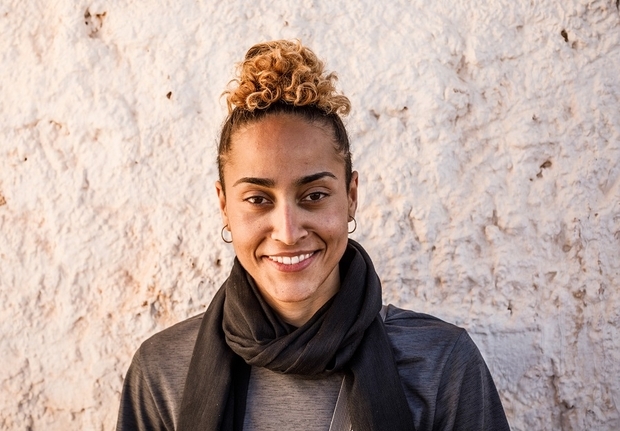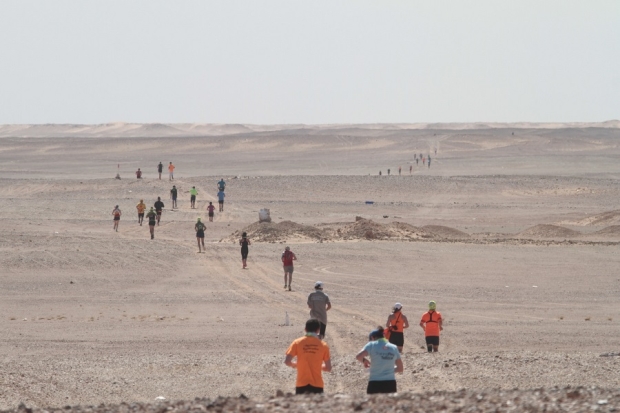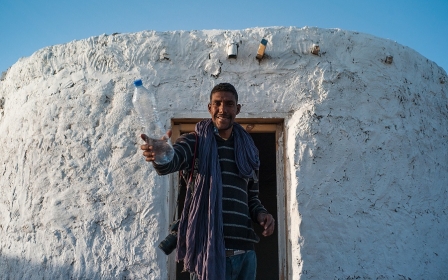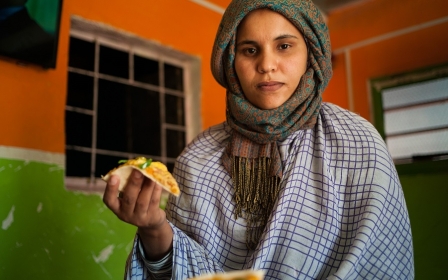Winning the Sahara Marathon: 'A spiritual journey back to who I am'

TINDOUF, Algeria – It was a journey back to her roots in Western Sahara that ended in triumph for the first-time marathon runner, Inmaculada Zanoguera.
In three hours, 48 minutes and 11 seconds, Zanoguera, 24, conquered the very first marathon she participated in and came in first place in the women's division of the race, amid the harsh environment of Algeria's western desert.
“It is a spiritual journey back to the origins of who I am, who my mother and my ancestors were, and above all, a journey back home,” declares the former NCAA university basketball player of Ohio's Toledo University, in the US.
Zanoguera, who is an athlete by training and a former member of the Spanish under-20 national basketball team, had very personal reasons for participating in the race.
“I had never asked too much about this matter, but [two years ago] Aisha showed me a document with three lines on it: the name of my biological mother, her date of birth and her nationality - Western Sahara.”
Zanoguera explains that her mother and father had to flee the Western Sahara War and received asylum in Spain in 1975, after which they had to give their children up for adoption.
"Even though I still don’t know why or how it happened, but, in that moment, I felt that I had to do something,” Zanoguera said.
However, the challenge for her went beyond the run and the unforgiving conditions of the Sahara Desert.
It is a race that symbolically connects the refugee camps surrounding Tindouf, Algeria, a route where runners endure the harsh conditions of the land that is now home to Sarahawi refugees.
Connecting with the land
Zanoguera was born on the Mediterranean island of Mallorca, which is part of Spain's Balearic islands.
She holds a degree in Business and Communications from Toledo University, where she is currently enrolled in a master's programme in English.
“On the long [training] runs, I listened to rap songs and I thought about what I want to do next. I thought a little about my basketball career and use what I learnt for the marathon: hard work, endurance and determination to accomplish your goals.
During the week the event takes place, the competitors live with the Sahrawis in typical tents called haimas or adobe homes, and eat couscous and camel meat while learning about their culture, their conflict and how the Sahrawi refugees survive.
“I can’t explain how I felt in the camps with just one emotion. It’s a mixture of many,” she said. “I had been waiting for this journey so long that, when I arrived, once I set foot in Tindouf, I felt relieved. Afterwards, everything was smooth.”
Zanoguera recalls that all of the Sahrawis she met were kind and full of energy, “even though they don’t have their basic food, health and drinking water needs covered.
“The refugees are such a generous people that they give you everything, even what they do not have,” she said.
‘I felt gratitude’
“When I crossed the finish line, I just felt gratitude towards the Sahrawi people and I think this is a great way to support them,” Zanoguera said.
Both of Zanoguera’s biological parents died in Spain, but she doesn’t know how or when.
“The fleeing of my family, including my grandparents, aunts and uncles was very abrupt and many people and many documents were lost. I only discovered the name of my biological mother, her date of birth and her nationality, but nothing about my father,” she said.
She only managed to locate a relative in Mallorca – her biological mother’s uncle – who is helping her find the rest of the family, but she said that there is very little information.
Running Home
Zanoguera partnered with Canadian filmmaker Michelle-Andrea Girouard to make a documentary tracing her journey, titled Running Home. Through a crowd-funding campaign, they managed to raise $6,315 for the trip and the documentary, $1,475 of which will go to Sahrawi refugees.
“The world needs to know about their fight to return to their homeland and this documentary wants to show it. Visiting refugee camps touches your heart. It's magic. I'm excited,” she said.
Zanoguera regrets that she could not find any of her extended family members in the refugee camps. She recalls going around asking the oldest refugees about her family’s tribe but to no avail.
“Neither cousins, nor aunts nor uncles. I’ve tried but no way,” she said.
Stay informed with MEE's newsletters
Sign up to get the latest alerts, insights and analysis, starting with Turkey Unpacked
Middle East Eye delivers independent and unrivalled coverage and analysis of the Middle East, North Africa and beyond. To learn more about republishing this content and the associated fees, please fill out this form. More about MEE can be found here.













